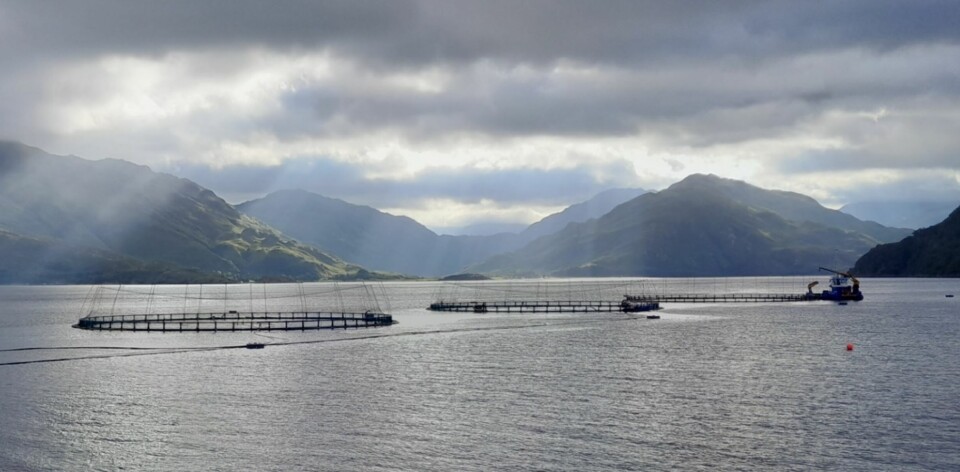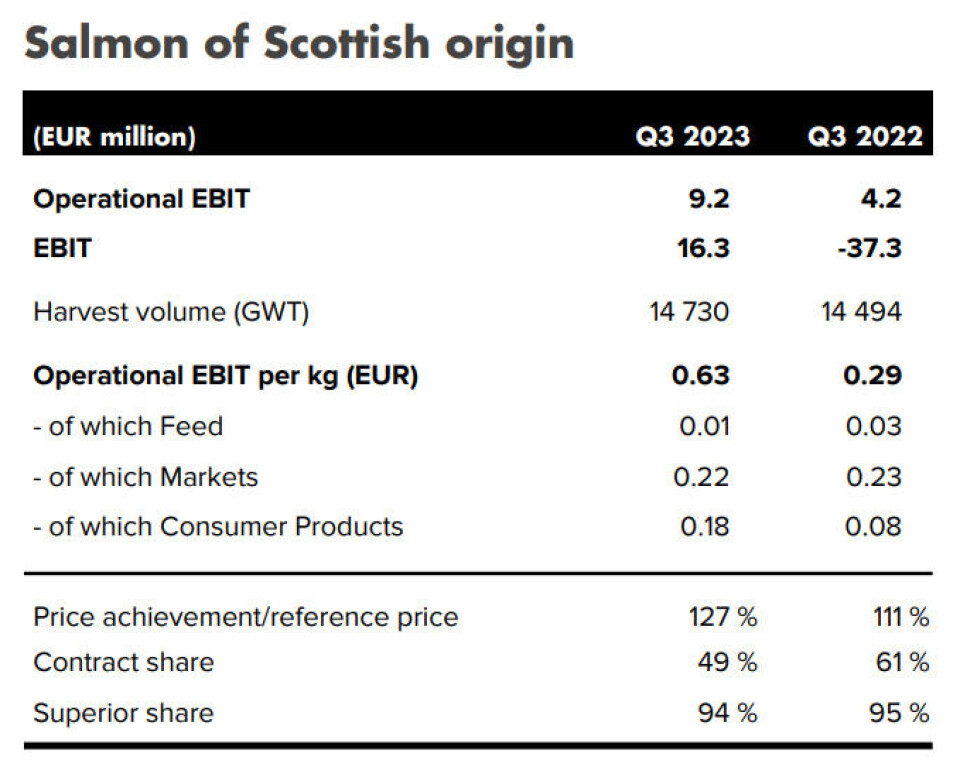
Mowi Scotland reduces 2023 harvest guidance by 3%
Salmon farmer reports trouble with micro jellyfish and plankton but still delivers operating profit
Salmon farmer Mowi Scotland has reduced its anticipated harvest volume for 2023 by 3%, from 64,000 to 62,000 gutted weight tonnes, in the wake of challenges experienced in the third quarter.
Micro jellyfish and higher plankton biomass were again evident in warmer seas compounded by this year’s El Niño, the company said in its Q3 report. Incident-based mortality costs were €7.6 million (£6.6m), the same as in Q3 last year.
“The above-mentioned issues have lingered on in October, and at the time of writing, we expect high biological cost in the fourth quarter. Further to this, the volume guiding for 2023 has been adjusted to 62,000 tonnes from 64,000 tonnes,” the company said.
Nonetheless, Mowi Scotland more than doubled operating profit year-on-year to €9.2m (Q3 2022: €4.2m) on a harvest of 14,730 gwt (14,494 gwt).
127% of reference price
Operational EBIT per kilo was €0.63 (€0.29), and the price that Mowi Scotland achieved for its fish was 127% (111%) of the reference price. The share of harvest classed as “superior” was 94% (95%).

“Earnings increased on improved achieved prices, partly offset by higher realised cost driven by previous inflation and more challenging environmental conditions driven by higher temperatures over time,” wrote Mowi.
Contribution from contracts, including contribution from Mowi’s Consumer Products secondary processing business, was positive relative to the reference price in the third quarter of both 2023 and 2022. The contract share in Q3 2023 was 49% (61%).
Canada
In Canada, Mowi made an operating loss of -€4.6m (-CAD 6.8m) after farms in British Columbia – which have been more profitable than Mowi’s Atlantic Canada operations in recent years - were significantly impacted by algal blooms and water quality issues. Operational EBIT for Canada West was € -0.5m, an €8m reverse compared to the €7.5m made in BC in Q3 2022.
The Q3 harvest volume in Canada was 7,485 gwt, compared with 11,115 gwt in the same quarter last year. In Canada West, the harvest volume was 5,855 gwt (9,624 gwt) a decrease of 3,769 gwt from the comparable quarter due to an uneven site mix. In Canada East, the harvest volume was 1,630 gwt (1,491 tonnes). Harvest volumes in Canada East were deferred into Q4 due to steadily improving biology in the region.
Incident-based mortality costs of €6.8m (€2.6m) were recognised in the quarter.
“Environmental challenges negatively impacted growth performance and survival rates in Canada West in the quarter,” wrote Mowi.
“In Canada East, ISA (infectious salmon anaemia) detections and sea lice levels continued to improve from prior years and the region continues to secure a steady improvement in farming performance and biological KPIs including seawater production, feed conversion ratio, average harvest weights and superior share.
“Costs in the fourth quarter are expected to remain at a high level negatively impacted by lower volumes as well as knock-on effects from the algae bloom in British Columbia.”
Chile and Ireland
In Chile, made an operating profit of €8.5m (€21.5m) on a harvest of 17,651 gwt (16,890 gwt). Operational EBIT per kilo was €0.48 (€1.27). The reduced profits were due to lower prices and higher feed costs, said Mowi.
In Ireland, where Mowi grows organic-certified salmon, the company made a profit of €1.5m, turning around a -€2.6m loss made in the same quarter last year. It harvested 1,994 gwt (2,165 gwt) and made EBIT per kilo of €0.75 (0€1.18).
“Biological performance in the quarter was good, with improved production, survival rate and feed conversion ratio. Last year’s operating metrics were negatively impacted by biological issues related to plankton bloom and poor water quality,” wrote Mowi.
Faroe Islands
Results were also positive in the Faroes, where Mowi more than doubled its operating profit year-on-year to €4.8m on a harvest of 2,532 gwt (1,730 gwt). EBIT per kilo was €1.91 (€1.06).
“Mowi Faroes harvested from the Oyndafjørður site in the third quarter which normally is the company’s best-performing site, as opposed to the exposed Sandsvág site in the third quarter of 2022,” wrote Mowi. “Price achievement was 9% above the reference price in the quarter (4% below), with good sizes contributing positively.
“Costs developed favourably as the effect of higher realised feed cost due to previous inflation was offset by improvements in other cost items.
“In the fourth quarter, Oyndafjørður is expected to be harvested out, and harvesting is expected to commence at the Sandsvág site. This is expected to increase costs somewhat.”
Iceland
Mowi’s Icelandic operation, Arctic Fish, made an operating profit of €0.9m on a harvest of 4,383 gwt. EBIT per kilo was €0.20.
“Earnings were impacted by increased biological cost due to lice issues in addition to the start-up phase of the new processing facility,” wrote Mowi, which added harvest volume was more than guided due to harvesting out the Kvígindisdalur site earlier than originally planned.
“Increased lice pressure negatively impacted biological performance in the third quarter and has lingered on in the fourth quarter. Improved lice strategy and treatment capacity is a clear priority for Arctic Fish going forward,” wrote Mowi.
“In addition, the bureaucracy around treatment approvals must be streamlined. Today, the process takes far too long and when a decision is finally made it is not always the correct one. It is critically important that the right measures are taken at the right time.”
Mowi said the fourth quarter is expected to be negatively impacted by low volumes. It has redcuded harvest volume guidance for 2023 from 15,000 gwt to 11,500 gwt, and further to 10,000 gwt in 2024.
Norway remains Mowi’s most important region. The company harvested 86,228 gwt in its four Norwegian operating regions in Q3 and made an operating profit of €185.1m. Operational EBIT per kilo was €2.15.






















































